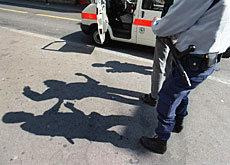Amnesty criticises Swiss police brutality

Amnesty International has condemned Switzerland’s police for using excessive force against foreigners and asylum seekers.
In its 2004 report, the human rights group also raised concerns about restrictions on the right to asylum in Switzerland and the xenophobic rhetoric of the Right.
The main criticism in Amnesty’s report was directed at the United States. The organisation said the US-led “war on terror” was “bankrupt of vision” and “had made the world a more dangerous place”.
But Switzerland did not escape scrutiny – as in previous years, Amnesty found fault with police handling of foreigners and asylum seekers.
Last year the organisation highlighted a handful of cases in which excessive force was used against non-Swiss – black Africans and Muslims in particular.
This year’s report – which documents the human rights situation in more than 150 countries – cites examples of police mistreatment of detainees in cantons Geneva, Zurich and Bern.
Amnesty drew attention to a police raid in canton Glarus on a hostel for asylum seekers. It said the asylum seekers – many of whom were naked – were bound hand and foot, blindfolded and photographed.
One 16-year-old was so frightened that he jumped out of a third-storey window and was seriously injured.
Amnesty said it was also concerned about the introduction of tougher asylum restrictions in Switzerland and xenophobic statements during last autumn’s parliamentary elections.
It said that across Europe an upsurge in nationalism and attacks on refugee rights had bolstered racism and discriminatory practices towards minorities.
It also deplored violence against women, which it described as “a major problem” in Switzerland.
No change
A spokeswoman for Amnesty’s Swiss section told swissinfo that the problems in Switzerland were the same as in previous years.
“The situation is stable,” said Manon Schick. “But in 2003, in contrast to previous years, no deaths resulted from the forced repatriation of asylum seekers.”
And she said the problems identified in Switzerland were common to many of its neighbours.
“These deviations have to be seen in a European context. A large number of European countries are taking a tougher line on asylum,” said Schick.
“And we have also documented police violence in Germany, for instance.”
Boël Sambuc, deputy head of the Federal Commission against Racism, said too little progress was being made.
“The problems continue and we have not seen the right measures taken to deal with them,” Sambuc told swissinfo.
“The commission is particularly troubled by police violence towards foreign minorities.”
Sambuc said the commission wanted to see an independent complaints authority set up to investigate allegations of police brutality.
Police brutality
Geneva police were also criticised for “excessive and unjustifiable” force during a demonstration in March against the World Trade Organization and during protests in June against the G-8.
Schick said the examples cited by Amnesty showed that not all cantons were applying the law correctly.
“Federal law doesn’t need to change, but the cantonal judicial authorities need to apply existing laws better.
“The Glarus affair shows that there are gaps in the training some cantons give to their police.”
Amnesty further condemned the use of Taser electric shock guns as a means of restraint in some Swiss cantons.
Schick said the organisation was calling on the cantons to consider the impact of these weapons before deciding whether to use them.
Violence against women
Another problem area highlighted by the human rights organisation was domestic violence. It said that in Switzerland 40 women died every year as a result of violence suffered in the home.
A survey showed that one in five women in the country aged between 20 and 60 suffered some form of domestic violence.
Despite federal and cantonal efforts to address the problem, discrimination and violence towards women remained a big concern, said Amnesty.
swissinfo
Statistics for 2003 from the annual report:
In 28 countries people were executed, and death sentences were passed in 63 countries.
In 47 countries extrajudicial executions were carried out.
In 28 countries people “disappeared”.
In 132 countries people were tortured by security forces, police or other state organs.
In 44 countries people were imprisoned for their beliefs, political views, or sexual orientation.
In 58 countries people were arbitrarily arrested or detained without charge.
In 35 countries armed opposition groups committed serious human rights violations.
Amnesty said the past 12 months had seen the most sustained attack on human rights in 50 years, with armed groups and governments equally to blame.
The organisation said the US-led “war on terror” was “bankrupt of vision” and “had made the world a more dangerous place”.

In compliance with the JTI standards
More: SWI swissinfo.ch certified by the Journalism Trust Initiative








You can find an overview of ongoing debates with our journalists here . Please join us!
If you want to start a conversation about a topic raised in this article or want to report factual errors, email us at english@swissinfo.ch.